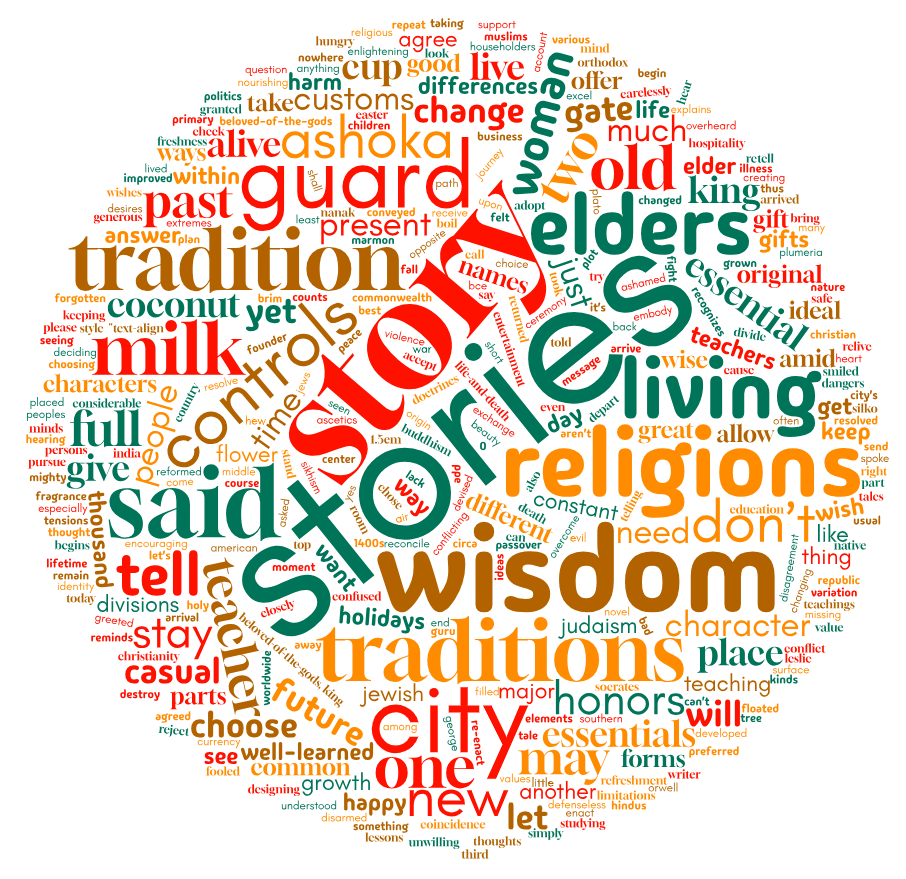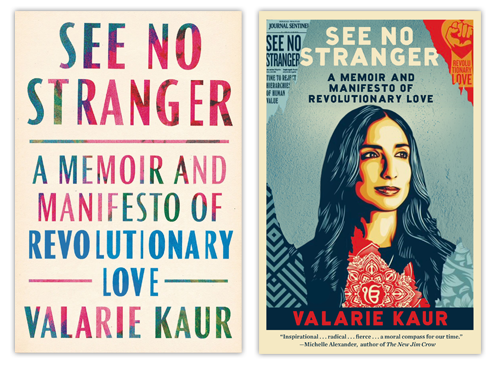which story are we living?
“I will tell you something about stories. They aren’t just entertainment. Don’t be fooled. They are all we have to fight off illness and death. You don’t have anything if you don’t have the stories. The evil of the world is mighty, but it can’t stand up to our stories.” (Leslie Marmon Silko)

A casual tale or an essential teaching?
Today is a major holy day for two worldwide wisdom traditions: Passover in the Jewish tradition, Easter in the Christian tradition. How did we get two different traditions from the same origin story? And which story are we living, if any?
The coincidence of religious holidays reminds us of the tensions between traditions old and new, and how to resolve them. The answer, as usual, is a story.
Once upon a time, there was a great city. Or at least the people of that city thought they were great. One day, a wise woman arrived at the city’s southern gate. The guard greeted her and asked her what business she had there. She was a teacher, she said. She would be happy to give wisdom lessons in the city, in exchange for a place to stay. The guard said he would check with the elders.
Telling the elders about the arrival of the wisdom teacher and her offer, the guard overheard their thoughts. One said, “We have all the wisdom and all the teachers we need here. We don’t need another one, especially not a woman.” Another elder spoke: “Right, yes. We are full of wisdom here. There is no room for this woman in our city. I say we send her away before she does any harm.” The third elder said, “I agree with both of you. But we don’t want to look bad or cause her any harm through a lack of hospitality. She may be hungry, and she has nowhere to stay. Let’s tell the guard to give her a full cup of coconut milk – full to the brim – and tell her, ‘Please accept this gift from the city elders. Like this cup, the city is full. We have no need for wisdom teachers, and we have no place for you to stay. We offer you this nourishing refreshment and our best wishes for a safe and enlightening journey through our country.’” They all agreed to this plan.
The guard took the cup of milk to the teacher at the gate and conveyed the message of the elders. The wisdom teacher smiled at the guard. She said, “I see that the elders of this city wish to be generous and wise. Yet, they are missing one thing.” Taking a flower from the plumeria tree by the gate, she placed it on top of the coconut milk. The flower floated on the surface of the milk. Its fragrance filled the air between them. The guard was disarmed.
“Take the milk back to the elders and tell them that I come in peace,” she said. “I simply add beauty and freshness to their considerable wisdom, if they will allow me to stay.”
Seeing their gift of coconut milk returned to them improved, and hearing the guard repeat what the woman said, they felt a little ashamed for a moment. Then they had a change of heart. “Let her in to the city,” they said, “and bring her to us.”
This is a variation of a story told by Guru Nanak, the founder of Sikhism, a tradition developed in India in the 1400s amid Hinduism and Islam.
The elders in this account were unwilling to change their story. Yet, stories are changing all the time. New characters arrive, old characters depart. Old ways of life end, new ways of life begin. But one thing can remain constant despite constant change: stories.

The Jewish people excel at living the story of their tradition and thus keeping their tradition alive. But even within the tradition, there is disagreement about which parts of the stories to keep alive, which parts of the story to live. Orthodox Jews hew closely to the original customs. Reform Judaism recognizes the limitations of applying ancient customs to our time and place. And of course, Judaism and Christianity could not overcome the differences of their preferred stories, and chose to remain separate. Divisions within traditions and separations among traditions often boil down to the stories we choose to live and the customs we want to keep alive. Stories are the currency of wisdom traditions. And politics.
“Who controls the past controls the future. Who controls the present controls the past.” (George Orwell, 1984)
And yet, who controls the story controls the past, the present, and the future.
The past is a story. The future is a story. The present is where and when we get to choose an answer to the question: which story are we living? Choosing which stories to tell and retell, which stories to enact and re-enact, we are deciding which stories to live and relive. We may fall short of living our ideal stories, but it’s the plot that counts. Stories give us our character, and our character is our identity.
Native American writer Leslie Marmon Silko explains the life-and-death nature of stories and identity in the novel Ceremony:
“I will tell you something about stories. They aren’t just entertainment. Don’t be fooled. They are all we have, you see, all we have to fight off illness and death. You don’t have anything if you don’t have the stories. Their evil is mighty but it can’t stand up to our stories. So they try to destroy the stories, let the stories be confused, or forgotten. They would like that. They would be happy. Because we would be defenseless then.”
In designing the ideal city of commonwealth, Plato and Socrates agree that character education begins with stories, and not just any stories will do.
Shall we just carelessly allow children to hear any casual tales which may be devised by casual persons, and to receive into their minds ideas for the most part the very opposite of those which we should wish them to have when they are grown up? . . . We cannot. (Republic)
So what should a new tradition do about stories? It has to choose. It cannot adopt all the stories of the old forms. It also cannot reject all the stories of the old forms; they have too much in common. It should take the middle way between these two extremes – an essential teaching of Buddhism. And the primary choice is the story of “the essentials of all religions,” what I call The Way with a Thousand Names.

Ashoka, a king in an ancient India circa 304–232 BCE, was faced with a similar choice. After living the story of violence, he wanted a new life. He chose teaching people to love the good of all religions, including ahimsa, aka nonviolence. This story of religious pluralism is preserved in edicts on rocks.
... King Ashoka honors both ascetics and the householders of all religions, and he honors them with gifts and honors of various kinds. But Beloved-of-the-Gods, King Ashoka, does not value gifts and honors as much as he values this — that there should be growth in the essentials of all religions. … King Ashoka, desires that all should be well-learned in the good doctrines of other religions. (“Ashoka”)
Passover and Easter are parts of a story. Everyday life is too. In our holidays and in our daily life, let us pursue the essentials of all religions. May we live a new story, one that unites the essentials of wisdom traditions, without silencing the unique character of each one: The Way with a Thousand Names.

Comments ()